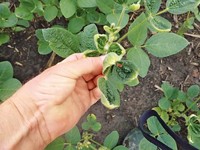Advertisement
Grab your lab coat. Let's get started
Welcome!
Welcome!
Create an account below to get 6 C&EN articles per month, receive newsletters and more - all free.
It seems this is your first time logging in online. Please enter the following information to continue.
As an ACS member you automatically get access to this site. All we need is few more details to create your reading experience.
Not you? Sign in with a different account.
Not you? Sign in with a different account.
ERROR 1
ERROR 1
ERROR 2
ERROR 2
ERROR 2
ERROR 2
ERROR 2
Password and Confirm password must match.
If you have an ACS member number, please enter it here so we can link this account to your membership. (optional)
ERROR 2
ACS values your privacy. By submitting your information, you are gaining access to C&EN and subscribing to our weekly newsletter. We use the information you provide to make your reading experience better, and we will never sell your data to third party members.
Policy
Pesticides Firm Hit With Record Fine
Enforcement: Scotts Miracle-Gro agrees to pay $10 million in criminal and civil penalties
by Cheryl Hogue
September 17, 2012
| A version of this story appeared in
Volume 90, Issue 38

Scotts Miracle-Gro will pay the largest criminal fine—$4 million—and the largest civil penalty—$6 million—ever assessed for violations of the federal pesticides law.
A major producer of pesticides for lawn and garden use that also sells wild bird food, Scotts agreed to the fines as part of a criminal plea agreement in a federal court case and a civil settlement with the Environmental Protection Agency. Both deals were finalized on Sept. 7.
In the criminal case, court papers show that the company pleaded guilty to 11 charges, including creating phony pesticide registration documents. A former employee who fabricated those registration documents between 2004 and 2007 has also pleaded guilty in a separate criminal case and awaits sentencing.
Scotts has admitted to having treated stored wild bird food with two insecticides not authorized for this use, including one labeled as toxic to birds, the court documents say. Two employees—a chemist and an ornithologist—warned the company in mid-2007 against using these pesticides on bird food, but Scotts continued the practice for six more months. In early 2008, Scotts voluntarily disclosed the problem to federal regulators and recalled the bird foods.
Under the plea agreement, Scotts will provide $500,000 to protect bird habitat in addition to paying the $4 million fine.
Ignacia S. Moreno, assistant U.S. attorney general for environment and natural resources, says the record-setting criminal fine under the Federal Insecticide, Fungicide & Rodenticide Act (FIFRA) is appropriate for the world’s largest marketer of residential-use pesticides.
The civil case involves what EPA describes as widespread noncompliance with FIFRA at Scotts, covering less severe violations than the criminal case. Without admitting guilt, Scotts agreed to settle the allegations by paying the $6 million penalty and completing $2 million in projects to control runoff of agricultural chemicals.
The violations “do not reflect our core values,” James S. Hagedorn, Scotts chairman and chief executive officer, writes in a letter posted on the company’s website. “We have learned a lot from these unfortunate events, and new people and processes have been put in place to prevent them from happening again.”




Join the conversation
Contact the reporter
Submit a Letter to the Editor for publication
Engage with us on Twitter